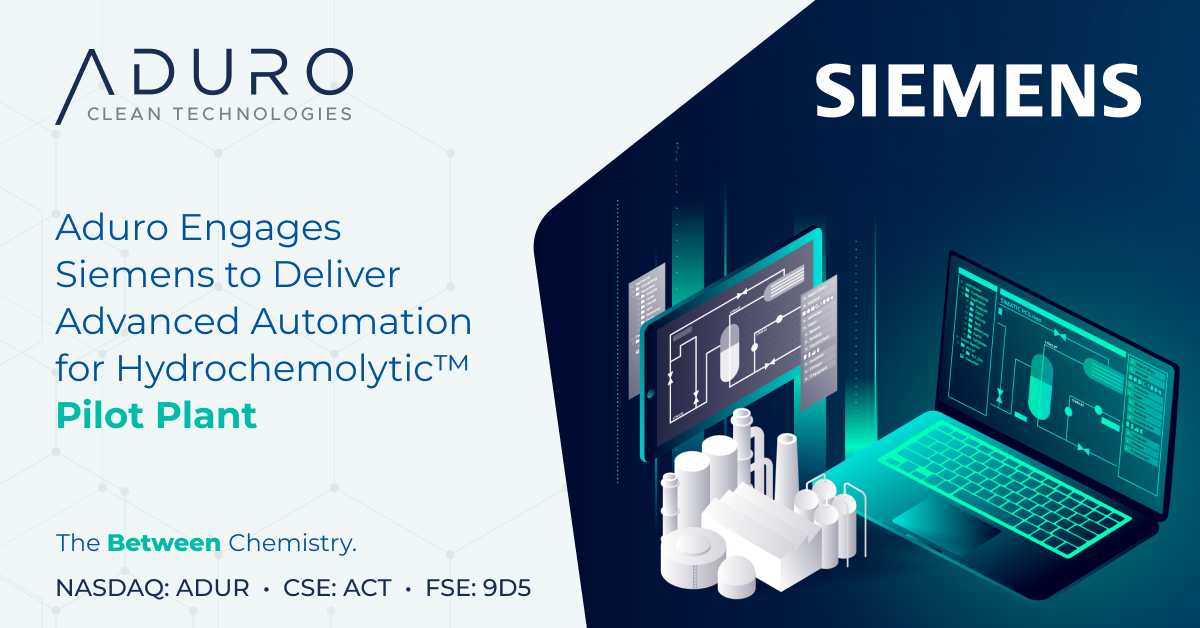Aduro Engages Siemens to Deliver Advanced Automation for Hydrochemolytic™ Pilot Plant
Rhea-AI Summary
Positive
- Strategic partnership with Siemens, a global leader in industrial automation, enhances technological credibility
- Advanced SIMATIC PCS neo system enables precise process control and optimization capabilities
- HCT technology demonstrates higher conversion rates and lower energy requirements compared to traditional pyrolysis
- Siemens' expertise will support scale-up planning for future demonstration plant
Negative
- Pilot Plant not operational until Q3 2025, indicating revenue generation still distant
- Multiple scale-up steps required before commercial implementation
Insights
Aduro's partnership with Siemens brings crucial automation expertise to their chemical recycling technology, advancing commercialization timeline while validating their innovative approach.
This strategic collaboration between Aduro and Siemens represents a significant technical milestone in Aduro's commercialization journey for their Hydrochemolytic™ Technology (HCT). By integrating Siemens' advanced SIMATIC PCS neo control system into their pilot plant, Aduro addresses one of the most challenging aspects of scaling up novel chemical processes: precise process control and optimization.
What makes HCT particularly promising compared to conventional pyrolysis is its selective chemistry that operates at moderate temperatures using water as a reactive medium. This selectivity enables higher polymer conversion rates with reduced energy input and minimal formation of unwanted byproducts like gases, char, and heavy tars. The technology's ability to produce more valuable hydrocarbons without requiring additional hydrogenation could translate to both cost and environmental advantages if successfully scaled.
The pilot plant represents a critical scaling step beyond Aduro's R2 continuous flow reactor, designed to validate the process under real-world conditions. Having Siemens' automation technology integrated from this stage provides several advantages:
- Centralized, secure process control for continuous operations
- High-quality data acquisition for performance optimization
- Digital twin capabilities to virtually test process conditions
- Foundation for future demonstration and commercial plant designs
While commercial-scale implementation remains years away (with pilot plant commissioning scheduled for Q3 2025), this partnership strengthens Aduro's technical foundation and enhances their credibility in the emerging chemical recycling sector. Siemens' experience with other chemical recycling companies provides valuable insights that could help Aduro navigate the challenges of scaling innovative processes to commercial viability.
Siemens' industrial automation expertise significantly de-risks Aduro's pilot plant development, bringing crucial data capture and process optimization capabilities.
From an industrial engineering perspective, Aduro's engagement of Siemens for their Next Generation Process Pilot Plant represents a critical strategic decision that directly addresses several of the most common failure points in chemical process scale-up.
The selection of Siemens' SIMATIC PCS neo distributed control system is particularly noteworthy. This web-based platform provides the sophisticated control architecture needed for challenging chemical processes with multiple variables and complex reaction pathways. For a technology like Hydrochemolytic™ processing that depends on precise reaction conditions for selectivity, having robust automation from Siemens significantly enhances operational reliability and data quality.
Process control system selection at this stage has far-reaching implications:
- The continuous-flow design requires tight integration between instrumentation and control systems
- Data collected during pilot operations will directly inform demonstration plant design parameters
- Remote monitoring capabilities allow for efficient troubleshooting and optimization
- The platform's scalability matches Aduro's modular commercialization approach
Siemens' alignment with Zeton Inc. (the plant builder) ensures system integration efficiency and minimizes commissioning delays. This type of coordination between automation provider and fabricator is essential but often overlooked in pilot plant projects.
The digital twin capabilities mentioned provide a powerful tool for process optimization without risking physical equipment - allowing Aduro to test operational parameters virtually before implementation. This capability typically accelerates development timelines and reduces optimization costs dramatically compared to purely empirical approaches.
While still in pre-commercial stages, this partnership demonstrates sophisticated engineering planning that addresses both immediate pilot needs and future scale-up requirements.
This project focuses on integrating Siemens’ advanced control and data systems into Aduro’s Next Generation Pilot Plant, supporting the advancement of Hydrochemolytic™ Technology toward industrial readiness
LONDON, Ontario, May 01, 2025 (GLOBE NEWSWIRE) -- Aduro Clean Technologies Inc. (“Aduro” or the “Company”) (Nasdaq: ADUR) (CSE: ACT) (FSE: 9D5), a clean technology company using the power of chemistry to transform lower-value feedstocks, like waste plastics, heavy bitumen, and renewable oils, into resources for the 21st century, announced today a strategic collaboration with Siemens Canada, a leader in industrial automation and digitalization, to supply advanced control systems and engineering services for Aduro’s Next Generation Process Pilot Plant (the “Pilot Plant”), scheduled for commissioning in Q3 2025.
At the core of the solution is Siemens’ SIMATIC PCS neo distributed control system—an advanced, web-based platform that will provide centralized, secure, and scalable process control for the continuous operation of the Pilot Plant. Siemens will also provide instrumentation, operator interfaces, and engineering services to support the plant’s commissioning and performance optimization. Siemens is providing the automation and controls scope in alignment with Zeton Inc., the builder of the Pilot Plant, to ensure seamless system integration and efficient commissioning. Additionally, Siemens will contribute technical input as Aduro begins preparing for the design of a demonstration plant (the “Demonstration Plant”).
“Our vision to deliver a modular, scalable chemical recycling solution with Hydrochemolytic™ Technology takes another step forward today,” commented Ofer Vicus, CEO of Aduro. “Partnering with Siemens—an organization recognized globally for engineering excellence and industrial innovation—enhances the foundation we’re building. Their technologies will help ensure our Pilot Plant operates safely and reliably while generating the high-quality process data needed to optimize performance and support Demonstration Plant planning. This collaboration strengthens our path to commercialisation and supports our ability to scale with confidence.”
Hydrochemolytic™ Technology (HCT), developed by Aduro, uses water as a reactive medium at moderate temperatures to selectively cleave carbon–carbon and carbon–heteroatom bonds in polymers. Unlike pyrolysis, which relies on extreme heat and broad thermal cracking, HCT operates under catalytic conditions that enable greater controls over reaction pathways. This selective chemistry enables in higher conversion rate of polymers into lighter, more valuable hydrocarbons that are stable and do not require further hydrogenation. The process also reduces energy input and minimal formation of undesired by-products such as gases, char or heavy tars. The Pilot Plant, currently under construction by Zeton Inc., is a fully instrumented, continuous-flow unit designed to validate the HCT process under real-world operating conditions. As a key scale-up from the earlier R2 continuous flow reactor, the Pilot Plant will provide engineering data, system learnings, and process insights necessary to inform the design and deployment of future demonstration and commercial facilities.
Siemens brings valuable experience from its work with chemical recycling companies, supporting the scale-up of emerging processes through advanced automation, control, and digitalization technologies. Its collaboration with Aduro reflects an interest in helping enable the next generation of recycling platforms—solutions that are differentiated, energy-efficient, and aligned with the principles of a circular economy.
Siemens’ PCS neo system allows for seamless automation across plant modules, secure remote access, and centralized data acquisition, giving Aduro precise control over key variables in the Hydrochemolytic™ process. The platform also supports digital twin development—helping simulate, test, and optimize process conditions virtually before implementing physical changes. These tools will be essential as Aduro prepares to move from the Pilot Plant to future commercial-scale operations. While the immediate focus is on delivering automation and control systems for the Pilot Plant, Siemens will also provide engineering services to support scale-up planning for the Demonstration Plant. These contributions include insights into process optimization, digital infrastructure, and plant design—drawing on Siemens’ global experience with innovative recycling projects.
Joris Myny, Senior Vice President, Digital Industries, Siemens Canada, said: “At Siemens, we are committed to supporting advanced recycling technologies that enable circularity and reduce environmental impact. Aduro’s Hydrochemolytic™ process offers a compelling alternative to conventional methods, and we’re proud to bring our automation and digitalization expertise to help scale it. With our PCS neo platform, we’re enabling real-time visibility, control, and flexibility—key factors in optimizing plant performance and supporting long-term growth. This collaboration reflects our support of innovators who are redefining how materials are recovered and reused.”
About Aduro Clean Technologies
Aduro Clean Technologies is a developer of patented water-based technologies to chemically recycle waste plastics; convert heavy crude and bitumen into lighter, more valuable oil; and transform renewable oils into higher-value fuels or renewable chemicals. The Company’s Hydrochemolytic™ technology relies on water as a critical agent in a chemistry platform that operates at relatively low temperatures and cost, a game-changing approach that converts low-value feedstocks into resources for the 21st century.
For further information, please contact:
Abe Dyck, Head of Business Development and Investor Relations
ir@adurocleantech.com
+1 226 784 8889
KCSA Strategic Communications
Jack Perkins, Senior Vice President
aduro@kcsa.com
Forward-Looking Statements
This news release contains forward-looking statements. All statements, other than statements of historical fact that address activities, events, or developments that the Company believes, expects, or anticipates will or may occur in the future, are forward-looking statements. The forward-looking statements reflect management’s current expectations based on information currently available and are subject to a number of risks and uncertainties that may cause outcomes to differ materially from those discussed in the forward-looking statements. The forward-looking statements in this release include, but are not limited to, the Company’s collaboration with Siemens to supply advanced control systems and engineering services for Aduro’s Hydrochemolytic™ Pilot Plant, scheduled for commissioning in Q3 2025; that Siemens will contribute technical input as Aduro begins preparing for the design of the Demonstration Plant,; that Aduro’s vision to deliver a modular, scalable chemical recycling solution with HCT will take another step forward with the collaboration; that the Pilot Plant will provide engineering data, system learnings, and process insights necessary to inform the design and deployment of future demonstration and commercial plants; that Siemens will provide valuable experience from its work with early-stage chemical recycling companies, supporting the scale-up of emerging processes through advanced automation, control, and digitalization technologies; that Siemens will also provide in-kind engineering services to support scale-up planning for the Demonstration Plant; that Siemens' PCS neo platform will enable real-time visibility, control, and flexibility—key factors in optimizing plant performance and supporting long-term growth. Although the Company believes that the assumptions inherent in the forward-looking statements are reasonable, forward-looking statements are not guarantees of future performance, and, accordingly, undue reliance should not be put on such statements due to their inherent uncertainty. Important factors that could cause actual results to differ materially from the Company’s expectations include, but are not limited to, the Company’s ability to successfully integrate Siemens’ advanced control systems and achieve the desired performance optimization; obtaining necessary regulatory approvals for the Pilot Plant and Demonstration Plant; changes in market demand for recycled plastics and other feedstocks; availability of sufficient financial resources to complete the Pilot Plant and Demonstration Plant, as applicable; potential operational issues during the commissioning and scaling up of the Pilot Plant and/or Demonstration Plant; the impact of any environmental regulations and sustainability requirements on the projects; the effectiveness of the collaboration between Aduro and Siemens, including any potential unforeseen technical issues, regulatory hurdles, adverse market conditions and/or other factors beyond the control of the parties. The Company expressly disclaims any intention or obligation to update or revise any forward-looking statements whether because of new information, future events, or otherwise, except as required by applicable law.

A photo accompanying this announcement is available at https://www.globenewswire.com/NewsRoom/AttachmentNg/997aec9a-80d9-4822-9c3a-45b55ec8ab4e








